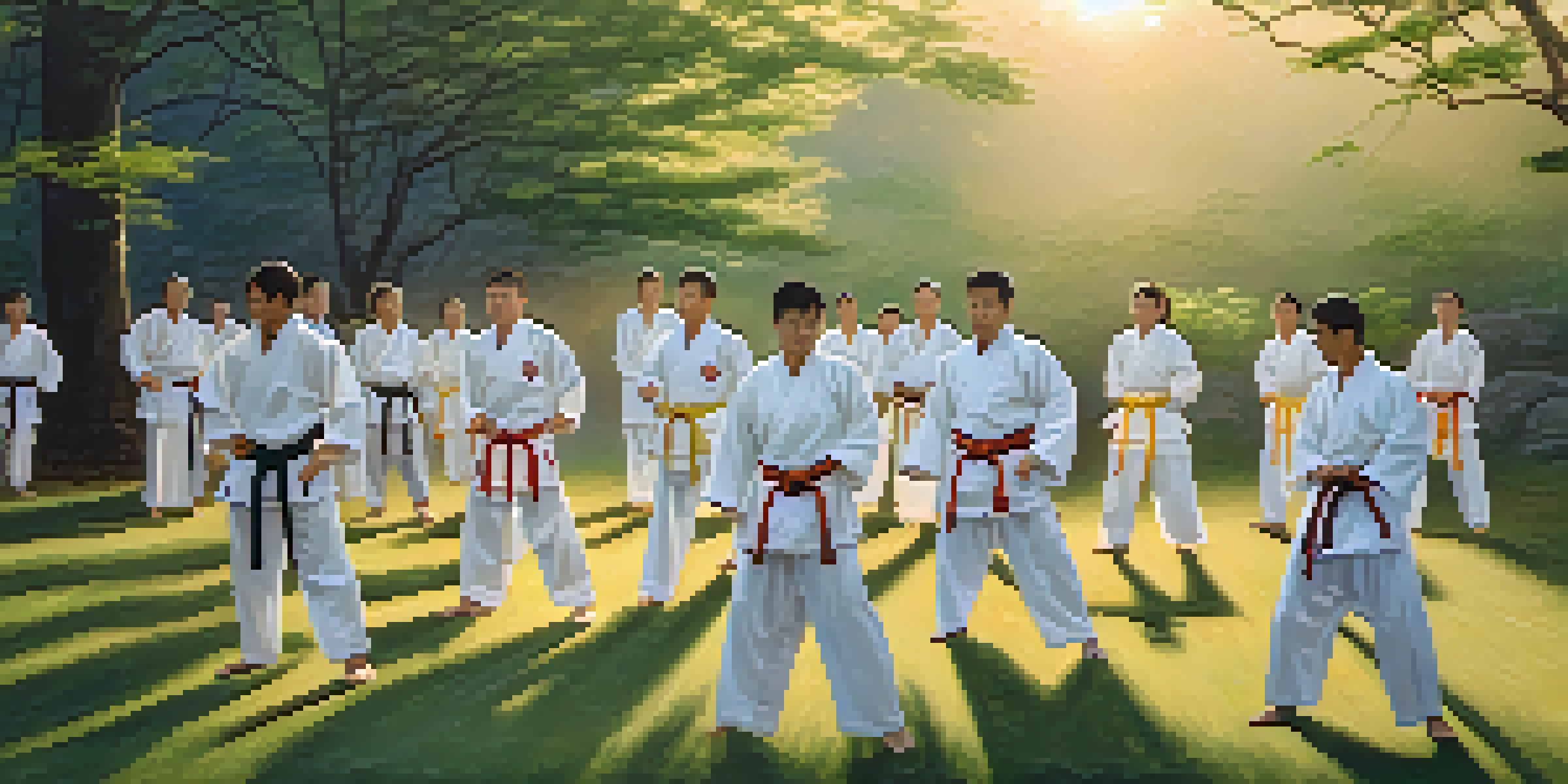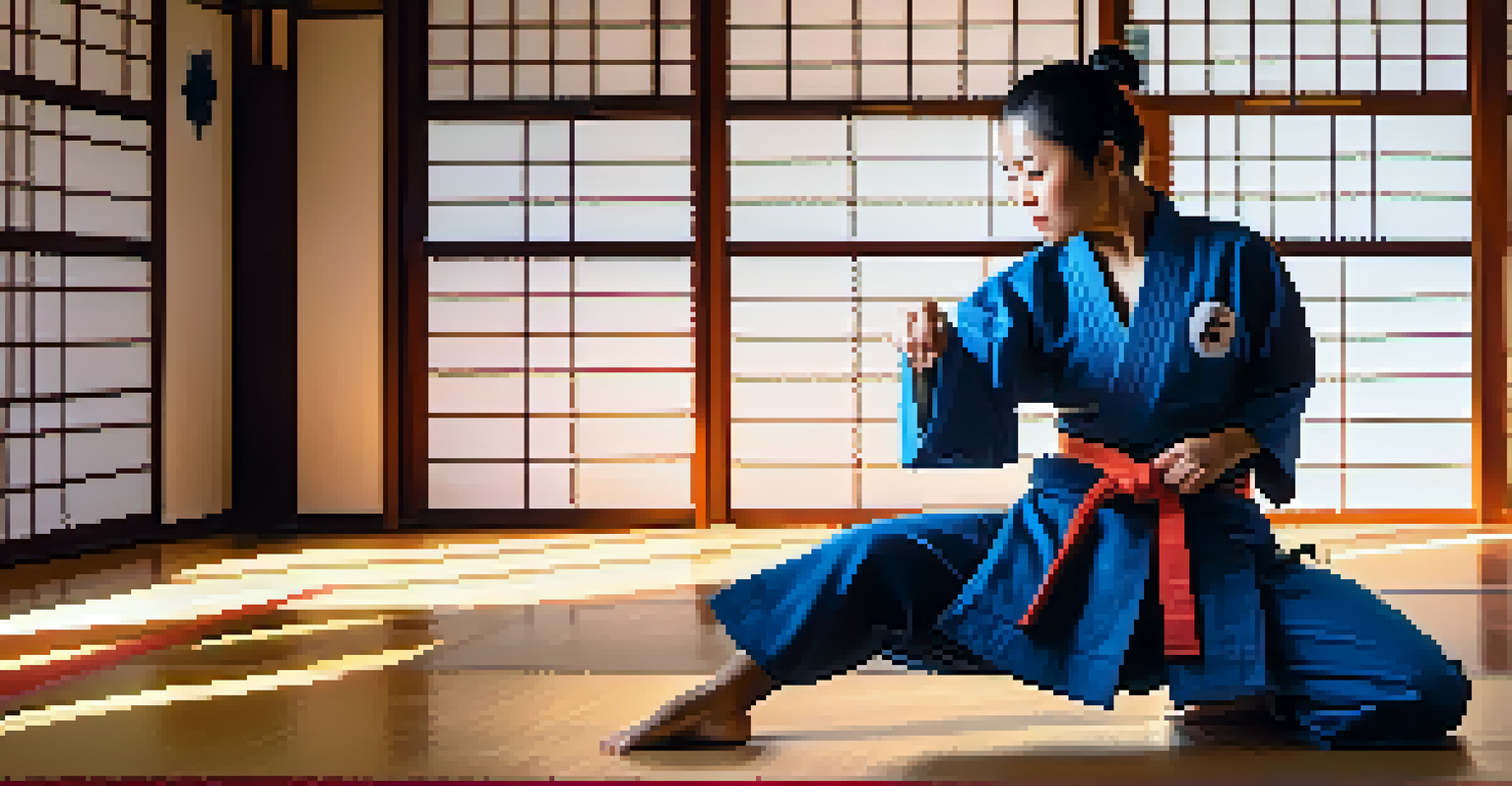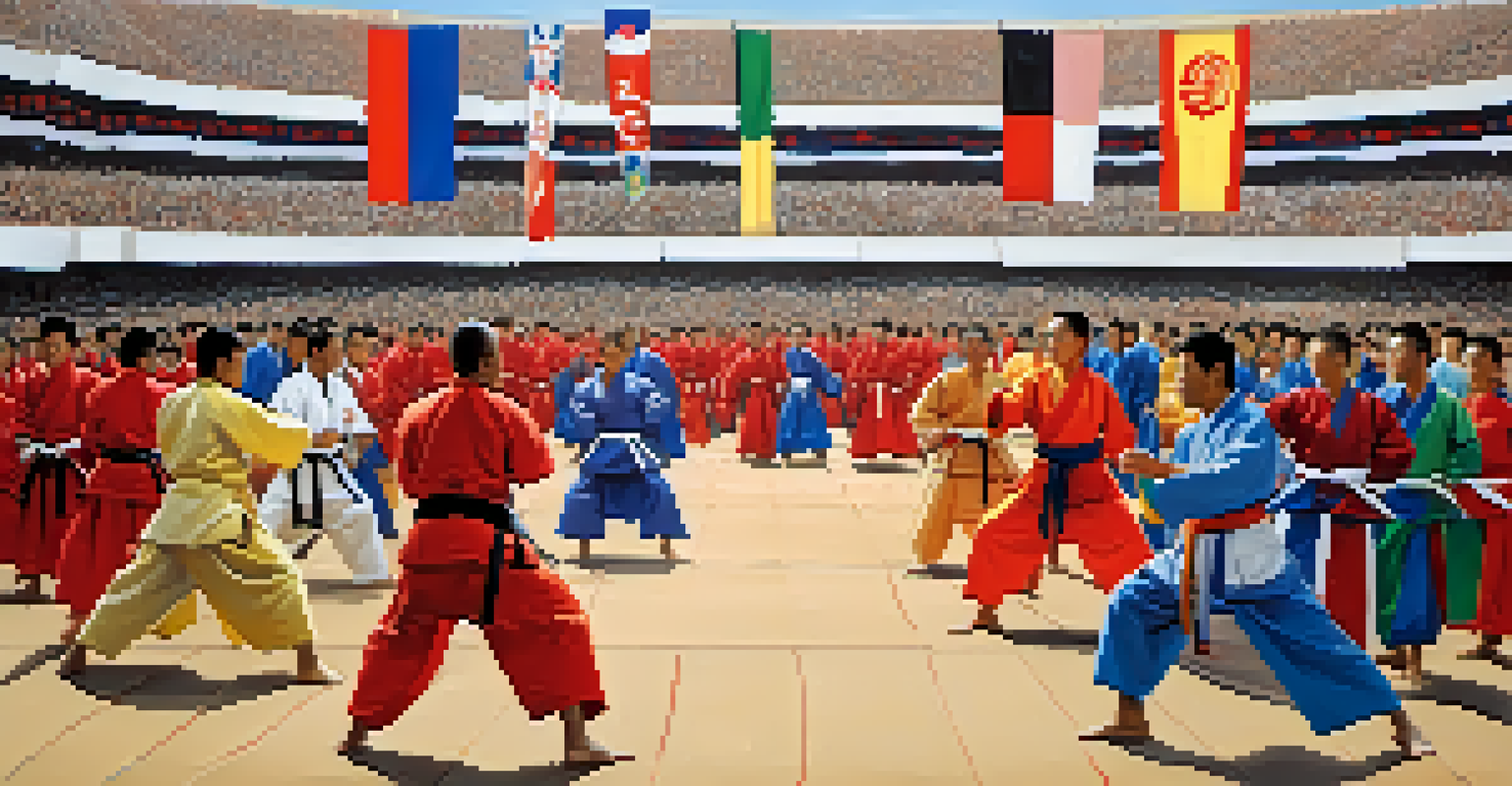Cultural Identity and Martial Arts: Bridging Personal Histories

Understanding Cultural Identity in Martial Arts
Cultural identity refers to the sense of belonging to a particular culture, shaped by traditions, history, and values. In martial arts, this identity often influences the style, techniques, and philosophies practiced. For example, Brazilian Jiu-Jitsu emphasizes adaptability, reflecting Brazil’s diverse cultural landscape and the blending of various influences.
Martial arts is a form of expression, a way to connect with oneself and one's heritage.
Each martial art carries its unique narrative, steeped in the culture from which it originates. Take karate, for instance; it embodies the spirit of Okinawa, showcasing resilience and discipline. By practicing these arts, individuals not only learn self-defense but also connect with their roots and the stories behind their chosen discipline.
As practitioners engage with their martial arts, they uncover layers of their cultural heritage. This journey can foster a deeper appreciation for their identity while also encouraging mutual respect for others' backgrounds, creating a more inclusive environment.
Personal Histories and Their Influence on Martial Arts
Every individual brings their personal history into their practice of martial arts. These histories—shaped by family, community, and personal experiences—can affect motivation, learning styles, and how one interprets techniques. For instance, someone who faced adversity may find strength and resilience in martial arts training, using it as a tool for empowerment.

Martial arts can serve as a form of storytelling, where practitioners express their experiences through movements and techniques. A practitioner might channel feelings of loss or triumph into their training, creating a unique narrative that resonates with their personal journey. This connection can be both cathartic and transformative.
Cultural Identity Shapes Martial Arts
Martial arts reflect the unique cultural narratives and values of their origins, influencing techniques and philosophies.
Additionally, sharing personal stories within martial arts communities fosters deeper connections among practitioners. This exchange of experiences can lead to mentorship opportunities, where seasoned martial artists guide newcomers, creating a supportive network that honors each individual’s journey.
Martial Arts as a Vehicle for Cultural Exchange
Martial arts offer a platform for cultural exchange, allowing practitioners from diverse backgrounds to come together. When individuals practice together, they share techniques, philosophies, and cultural traditions, enriching their understanding of each other. This exchange can break down barriers and promote unity among different cultures.
The beauty of martial arts lies in its ability to bring together people from diverse backgrounds, creating a shared journey of growth and understanding.
For example, international martial arts competitions showcase not just skill but also cultural heritage. Participants often wear traditional attire or perform culturally significant rituals, highlighting the unique backgrounds they represent. Such events create a vibrant tapestry of global martial arts, fostering camaraderie and respect.
Moreover, cross-cultural partnerships in martial arts schools can lead to innovative training methods that blend techniques from various traditions. This synergy not only enhances individual practice but also cultivates a sense of belonging within a global community of martial artists.
The Role of Traditions in Shaping Identity
Traditions play a vital role in martial arts, serving as the backbone for many styles. These practices, passed down through generations, carry significant meaning and often reflect the values of the culture they originate from. For instance, the bowing ritual in many Eastern martial arts signifies respect and humility, fundamental principles in these societies.
As practitioners embrace these traditions, they forge a connection not only with their art but also with the history behind it. This connection can deepen their sense of identity, allowing them to embody the values and lessons that their martial art conveys. It's as if they are stepping into a lineage that transcends time.
Personal Histories Enhance Practice
Individual experiences and backgrounds play a crucial role in shaping how practitioners engage with martial arts.
Furthermore, engaging with traditions can inspire personal growth. By understanding the philosophies that underpin their practice, martial artists can apply these lessons to their lives, cultivating qualities such as discipline, respect, and perseverance that resonate far beyond the dojo.
Cultural Identity and Inclusivity in Martial Arts
Cultural identity in martial arts can lead to a more inclusive atmosphere, where diverse backgrounds are celebrated. As practitioners share their unique perspectives, they create a richer training environment that fosters understanding and respect. This inclusivity encourages everyone, regardless of their background, to participate and thrive.
Schools that prioritize inclusivity often see enhanced team dynamics, where support and collaboration flourish. For example, when students from varying cultural backgrounds come together, they can learn from each other’s experiences, techniques, and insights, enriching their martial arts journey. This creates a sense of belonging that extends beyond the practice itself.
Ultimately, embracing cultural diversity in martial arts not only benefits the individuals involved but also strengthens the community as a whole. By valuing each person's story, martial arts can become a powerful tool for connection and growth, paving the way for a more harmonious practice.
Martial Arts as a Reflection of Societal Changes
Martial arts often reflect broader societal changes and cultural shifts. As communities evolve, so do their martial arts practices, adapting to new values and norms. For example, the rise of women's empowerment has led to increased female participation in martial arts, changing the dynamic and perceptions within the sport.
These shifts not only influence who practices martial arts but also how they practice. Many schools are now incorporating self-defense courses tailored to women's needs, highlighting the importance of personal safety and empowerment. This responsiveness to societal changes illustrates the adaptability of martial arts as a discipline.
Martial Arts Foster Cultural Exchange
Martial arts serve as a platform for cultural exchange, promoting unity and understanding among diverse practitioners.
Furthermore, as societal values around diversity and inclusion grow stronger, martial arts communities are becoming more welcoming to practitioners of all backgrounds. This evolution signifies a collective recognition of the importance of representation and accessibility in the martial arts world.
The Transformative Power of Martial Arts on Identity
Engaging in martial arts can lead to profound personal transformation, reshaping one’s identity in the process. Many practitioners find that as they develop their skills, they also cultivate self-confidence and resilience. This newfound strength often spills over into other areas of life, enabling them to face challenges with greater assurance.
Moreover, martial arts training often encourages introspection and self-discovery. Through the discipline of practice, individuals may confront personal limitations and fears, ultimately emerging with a stronger sense of self. This journey of growth is not only empowering but can also redefine how they view their cultural identity.

In conclusion, the impact of martial arts on personal identity is an ongoing process, shaped by experiences, interactions, and cultural narratives. As individuals continue to train, they weave their stories into the fabric of martial arts, creating a rich tapestry of personal and cultural identity that honors both their past and present.